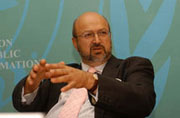 12 February 2009 – A senior United Nations official will meet with Serbian ministers later this month for wide-ranging discussions on Kosovo, which proclaimed its independence a year ago in a move that Serbia rejects.
12 February 2009 – A senior United Nations official will meet with Serbian ministers later this month for wide-ranging discussions on Kosovo, which proclaimed its independence a year ago in a move that Serbia rejects.
Secretary-General Ban Ki-moon’s Special Representative for Kosovo Lamberto Zannier received an invitation to meet with Serbia’s Foreign Minister Vuk Jeremic and Minister for Kosovo Goran Bogdanovic in Belgrade later this month, which he has accepted, the UN Interim Administration Mission in Kosovo (UNMIK) announced today.
It said the consultations would broach a broad range of issues relating to Mr. Ban’s most recent report to the Security Council, in which he stressed the need for a reconfiguration of UNMIK after Kosovo’s declaration of independence from Serbia in February last year.
Noting that the Mission has faced significant challenges to its ability to perform the vast majority of its tasks as an interim administration, including in civil and economic governance, where new institutions are being created and new roles assumed by the Kosovo authorities under the constitution they adopted, Mr. Ban said reconfiguration was being accelerated to adapt fully to the prevailing circumstances on the ground.
UNMIK took over the administration of Kosovo in 1999 after North Atlantic Treaty organization (NATO) forces drove out Yugoslav troops amid deadly fighting with the majority ethnic Albanian population there.
The UN has remained neutral on the question of the status of Kosovo, since its declaration of independence.
Mr. Zannier recently held consultations with Kosovo authorities similar to those he will have in Belgrade, and is also consulting with other relevant stakeholders, in particular the European Union (EU), which is undertaking an enhanced operational role with its EULEX mission on the rule of law, the largest civilian mission ever launched under the European Security and Defence Policy.
EULEX, which works under the general framework of United Nations Security Resolution 1244, operates under the overall authority and within the status-neutral framework of the UN, focusing particularly on the areas of international policing, justice and customs.
Serbia has accepted these arrangements, but Kosovo’s authorities reject them, pledging instead to cooperate with EULEX in accordance with the mandate foreseen for it in Kosovo’s declaration of independence, its constitution and its legislation.
In his report Mr. Ban said he was encouraged by Kosovo’s indication that it was willing to cooperate with EULEX and, inter alia, the EU and NATO.
 Eurasia Press & News
Eurasia Press & News
